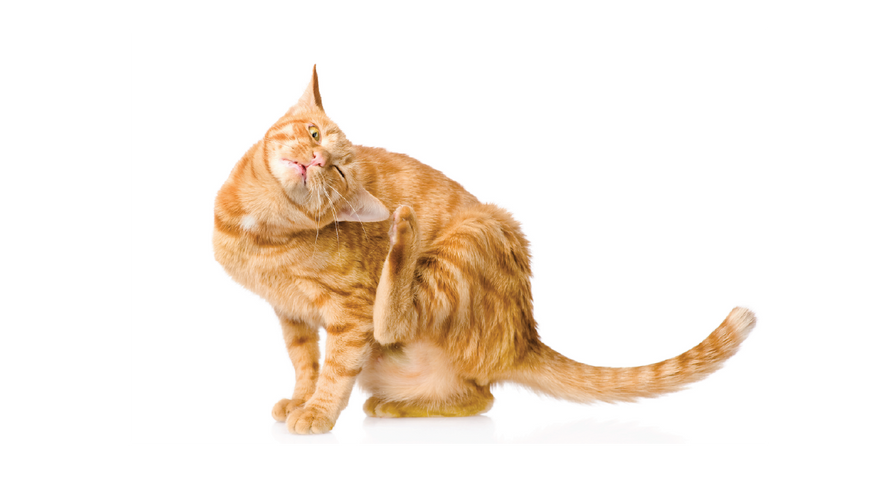Alleviating Your Cat’s Itchy Skin: Practical Solutions and Care Tips
10th Jun 2024
Cats often communicate more through their behaviour than through their meows, and constant scratching is a clear message. This guide will help you understand the causes behind your cat's itchy skin and how to treat them, covering everything from fungal infections to stress-induced itches.
Ringworm
Ringworm is a common fungal infection, especially in kittens, young cats, and those from shelters. Despite its name, it's not caused by worms but by dermatophytes, a group of fungi.
Identifying Ringworm in Cats Ringworm appears as dry, crusty, itchy, and scabby lesions, typically starting on the ears and feet before spreading. These lesions often lead to patches of hair loss. The itchiness is due to the body's immune response to the fungi, which thrive in warm, humid environments.
Treating Ringworm Given its contagious nature, seek veterinary treatment if you suspect ringworm. Treatment can take months and may involve oral medications, topical creams, and thorough cleaning of the environment to prevent spread.
Our top picks to treat fungal infection:
Ilium Fungafite Antifungal Cream For Cats
Malaseb Shampoo 250ml & Pyohex Lotion 100ml Pack
Note: Always consult a vet prior to treatment.
Stress
Stress can significantly worsen skin issues in cats, though it’s rarely the sole cause.
Symptoms of Stress in Cats Cats often over-groom when stressed, leading to skin itchiness, redness, and hair loss. Over-grooming usually targets easily accessible areas like the legs and abdomen. Changes in environment, such as new family members or moving house, can trigger these behaviours.
Managing Stress Addressing the sources of stress is crucial.
- Diet: A Diet that includes hydrolysed milk protein and L-tryptophan, can help manage behavioural changes due to stress.
- Environmental Changes: Feliway diffusers can help, with different versions for general stress and tension among household cats.
- Supplements: Zylkene capsules, containing a natural calming ingredient, can be mixed with food or PAW By Blackmores Complete Calm Multivitamin & Tryptophan Chews For Cats.
- Play: Engage your cat in play activities to release endorphins and reduce stress.
Shop our full range of stress and anxiety supplements here.
Note: If dietary changes, environmental modifications, and supplements aren't enough, consult a vet for calming medications.
Allergies
Allergies can come from food, fleas, or environmental factors, causing severe itching.
Identifying Allergies Symptoms include scabs, ulcers, open sores, and intense itching. Determining the specific allergen often involves a process of elimination.
Common Allergy Causes
- Flea Allergies: Effective flea control is essential.
- Insect Bites: Mosquito bites can irritate sensitive areas like the ears and nose. Natural repellents and environmental management can help.
- Immune Disorders: Conditions like pemphigus foliaceus and plasma cell pododermatitis can cause significant skin issues.
- Food Allergies: Itching around the head and neck, often accompanied by gastrointestinal symptoms.
Treating Allergies
- Diet: Conduct a diet trial with specialised formulas like Hills Prescription or Royal Canin Hypoallergenic. Shop our range of Prescription and Vet diets here.
- Allergen-Specific Immunotherapy (ASIT): Involves serum allergy testing and can take several months to be effective.
- Cyclosporine: For chronic allergic dermatitis, although it takes a few weeks to show results.
- Corticosteroids: Prednisolone can control itching but must be used correctly to minimise side effects.
- Flea Control: Regular treatment and home cleaning are essential. Shop our range of flea, tick and worming protection here.
Sunburn
Cats can get sunburned, leading to itchy skin from the resulting damage and inflammation.
Preventing Sunburn
- Limit Sun Exposure: Keep cats indoors during peak sunlight hours.
- Use Sunscreen: Apply pet-safe sunscreen to exposed areas.
- Provide Shade: Ensure there are shaded areas outdoors.
- UV-Blocking Film: Install UV-blocking film on windows for indoor sunbathing cats.
Treating Sunburn
- Cool Compress: Apply for 5-15 minutes to relieve pain and reduce inflammation.
- Pain Relief: Administer as prescribed by a vet.
- Cleansing Severe Lesions: Prevent infection and promote healing.
- Topical Medications or Dressings: Protect the affected skin.
- Antibiotics: If infection occurs.
- Hospitalisation: For severe cases, providing intensive care and monitoring.
Salmon Oil for Skin Health
Supplementing with essential fatty acids can improve skin health. Salmon oil, high in Omega-3 fatty acids (EPA and DHA), is recommended.
Choosing Supplements Select high-quality, ethically sourced supplements like Antinol or Omega Plus. Always consult a vet before adding new supplements to your cat's diet.
Fish Oil Caution Be aware of potential risks, such as mercury content or excess vitamins A and D, which can cause serious health issues. Monitor your cat for any adverse reactions, including gastrointestinal symptoms or changes in health.
Our top picks for skin health:
Natural Animal Solutions Omega Oil 3 6 & 9 for Cats
HempPet Hairball Relief Hemp Seed Nectar Oil Blend + Hoki Fish & MCT Oil For Cats
Shop our full range of skin & coat health supplies for cats here, we have a range of topical treatments, chews and medicated shampoos available.
In summary, understanding the root causes of your cat’s itchiness and providing appropriate treatments, from medical interventions to environmental adjustments, is key to keeping your feline friend comfortable and healthy.

